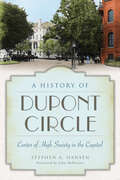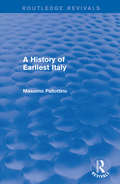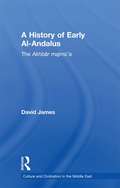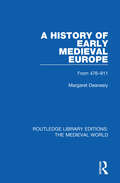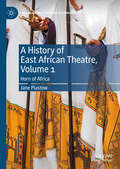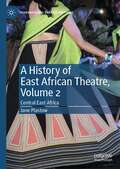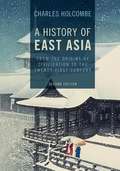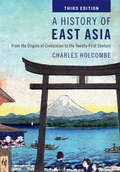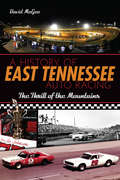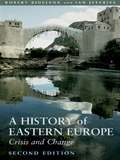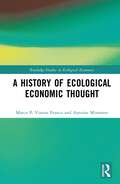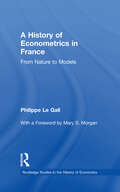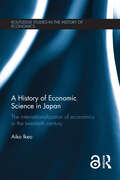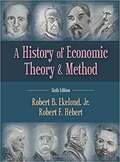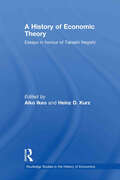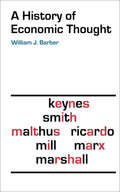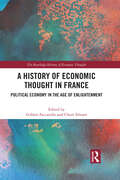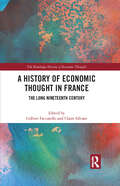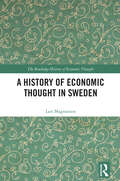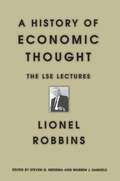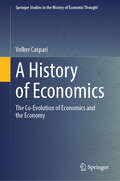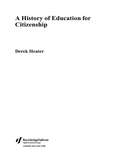- Table View
- List View
A History of Dupont Circle: Center of High Society in the Capital (Landmarks Ser.)
by Stephen A HansenDuring the Gilded Age, Dupont Circle was Washington's undisputed center of wealth, power and status. Over twenty years, it evolved from small farms and an overrun city cemetery to a community of grand homes for society's elite. Residents included future president William Taft, inventor Alexander Graham Bell, newspaper publisher Cissy Patterson and many more. From the intimate dinners and receptions of the Cave Dwellers to the lavish balls of Mary Townsend and others in the "smart set," Dupont Circle marked each social season in the capital. Satirized in Mark Twain's novel "The Gilded Age," the nouveau riche lifestyle of Dupont Circle was fodder for newspaper celebrity gossip. Author Stephen Hansen brings to life the intriguing history of Washington's famed Dupont Circle.
A History of Earliest Italy (Routledge Revivals)
by Missimo PallottinoIn A History of Earliest Italy, first published in 1984, Professor Pallottino illumines the wide variety of peoples, languages, and traditions of culture and trade that constituted the pre-Roman Italic world. Since the written sources are fragmentary, archaeology provides the central reservoir for evidence of the societies and institutions of the varied peoples of early Italy. This incisive and immensely readable account unfolds from the Bronze Age to the unification of the Italian peninsula and Sicily by Rome following the flourishing Archaic period. It examines the relationships among the peoples of the peninsula and the influence of Mycenae and Greece in trade and colonisation. In telling the story of the early stages of the eternal dialogue between national vocation and local diversity in Italy, Professor Pallottino demonstrates that it is no less deserving of our attention than its contemporary Greek and later imperial Roman counterparts.
A History of Early Al-Andalus: The Akhbar Majmu'a (Culture and Civilization in the Middle East)
by David JamesThe Akhbār majmū‘a, or 'Collected Accounts', deal with the Muslim conquest of the Iberian peninsula in 711 and subsequent events in al-Andalus, down to and including the reign of ‘Abd al-Rahmān III (912-961), founder of the Umayyad caliphate of al-Andalus . No Arabic text dealing with the early history of al-Andalus has aroused more controversy, and its contents and origin have occupied the attention of leading scholars of Islamic Spain since its publication in 1867. This book gives the first complete English translation of this key contemporary text, together with notes, comments, appendices and maps. It is introduced by a survey of scholarly opinion on the text from the nineteenth to the twenty-first century in which all the - often heated - arguments around the text are explained. The translator concludes his introduction with an in-depth examination of the manuscript containing the only surviving copy of the text and presents some interesting new evidence provided by scribe which has gone unnoticed until now. Providing new insights into this significant Arabic text, this book will be of great interest to scholars of the history of Spain and Portugal, Islamic history, and Mediaeval European history.
A History of Early Medieval Europe: From 476-911 (Routledge Library Editions: The Medieval World #10)
by Margaret DeaneslyOriginally published in 1956, A History of Early Medieval Europe traces the changes that took place in Europe between the fifth and tenth centuries, a time of social and political upheaval, when the organization of the Roman Empire, with its single emperor, army and civil service, was replaced by the divided Europe of the Germanic kingdom in the west and the Byzantine empire in the east.
A History of Early Modern Southeast Asia, 1400-1830
by Barbara Watson Andaya Leonard Y. AndayaWritten by two experienced teachers with a long history of research, this textbook provides students with a detailed overview of developments in early modern Southeast Asia, when the region became tightly integrated into the world economy because of international demand for its unique forest and sea products. Proceeding chronologically, each chapter covers a specific time frame in which Southeast Asia is located in a global context. A discussion of general features that distinguish the period under discussion is followed by a detailed account of the various sub-regions. Students will be shown the ways in which local societies adapted to new religious and political ideas and responded to far-reaching economic changes. Particular attention is given to lesser-known societies that inhabited the seas, the forests, and the uplands, and to the role of the geographical environment in shaping the region's history. The authoritative yet accessible narrative features maps, illustrations, and timelines to support student learning. A major contribution to the field, this text is essential reading for students and specialists in Asian studies and early modern world history.
A History of East African Theatre, Volume 1: Horn of Africa (Transnational Theatre Histories)
by Jane PlastowThis book is the first ever transnational theatre study of an African region. Covering nine nations in two volumes, the project covers a hundred years of theatre making across Burundi, Djibouti, Eritrea, Ethiopia, Kenya, Rwanda, Somalia, Tanzania, and Uganda. This volume focuses on the theatre of the Horn of Africa. The book shows how the theatres of Djibouti, Eritrea, Ethiopia, and Somalia, little known in the outside world, have been among the continent's most politically important, commercially successful, and widely popular; making work almost exclusively in local languages and utilizing hybrid forms that have privileged local cultural modes of production. A History of African Theatre is relevant to all who have interests in African cultures and their relationship to the history and politics of the East African region.
A History of East African Theatre, Volume 2: Central East Africa (Transnational Theatre Histories)
by Jane PlastowThis second volume of A History of East African Theatre focuses on central East Africa; on Burundi, Kenya, Rwanda, Tanzania and Uganda. The first chapter is concerned with francophone theatres, comparatively studying work coming out of Burundi and Rwanda alongside a focus on French language theatre in Djibouti. The chapter is particularly concerned to explore how French and Belgian cultural policies impacted theatre during the colonial period and how the French ideas of Francafrique and promotion of elite, French language art have continued to resonate in the post-colonial present. Chapters Two and Three look comparatively at the rich theatre histories of Kenya, Tanzania and Uganda, and are divided between a study of British East African colonial impact and an analysis of the post-colonial period illustrating how divergent political thought and societal make-up led to exponential differentiation in national theatres. The final chapter, on Theatre for Development and related social action theatre, covers the whole East African region, offering the first ever historicised analysis of this mode of theatre making which, since the 1980s, has come to dominate funding and opportunity in performance arts.
A History of East Asia
by Charles HolcombeCharles Holcombe begins this extraordinarily ambitious book by asking the question 'What is East Asia?' In the modern age, many of the features that made the region - now defined as including China, Japan, and Korea - distinct have been submerged by the effects of revolution, politics or globalization. Yet, as an ancient civilization, the region had both an historical and cultural coherence. It shared a Confucian heritage, some common approaches to Buddhism, a writing system that is deeply imbued with ideas and meaning, and many political and institutional traditions. This shared past and the interconnections among three distinct, yet related societies are at the heart of this book, which traces the story of East Asia from the dawn of history to the twenty-first century. Charles Holcombe is an experienced guide who encapsulates, in a fast-moving and colorful narrative, the vicissitudes and glories of one of the greatest civilizations on earth.
A History of East Asia: From the Origins of Civilization to the Twenty-First Century
by Charles HolcombeCharles Holcombe begins by asking the question 'what is East Asia?' In the modern age, many of the features that made the region - now defined as including China, Japan, Korea and Vietnam - distinct have been submerged by the effects of revolution, politics or globalization. Yet, as an ancient civilization, the region had both an historical and cultural coherence. This shared past is at the heart of this ambitious book, which traces the story of East Asia from the dawn of history to the twenty-first century. The second edition has been imaginatively revised and expanded to place emphasis on cross-cultural interactions and connections, both within East Asia and beyond, with new material on Vietnam and modern pop culture. The second edition also features a Chinese character list, additional maps and new illustrations.
A History of East Asia: From the Origins of Civilization to the Twenty-First Century
by Charles HolcombeThe third edition of this ambitious book begins by asking: What is East Asia? Today, many of the features that made the region distinct have been submerged under revolution, politics, or globalization. Yet in ancient times, what we now think of as China, Korea, Japan, and Vietnam had both historical and cultural coherence. Thoroughly revised and updated to include recent developments in East Asian politics, with new illustrations and suggestions for further reading, this book traces the story of East Asia from the dawn of history to the modern age. New discussion questions at the end of each chapter encourage readers to reflect, while a glossary, pronunciation guide, and parallel timeline enable a closer engagement with this complex subject. Charles Holcombe is an experienced and sure-footed guide who encapsulates, in a fast-moving and colorful narrative, the connections, commonalities, and differences of one of the most remarkable regions on earth.
A History of East Tennessee Auto Racing: The Thrill of the Mountains (Sports)
by David McgeeEast Tennessee isn't typically mentioned among stock car racing's formative hotbeds. But the region from Bristol to Oneida and Chattanooga encapsulates a significant portion of the sport's history. From pioneers like Brownie King and Paul Lewis of Johnson City to former national champions Joe Lee Johnson of Chattanooga and L.D. Ottinger of Newport, East Tennessee has produced many of NASCAR's great drivers. The region is home to one of the world's largest sports stadiums in the Bristol Motor Speedway, but NASCAR also made regular visits to other area tracks. Whether the surface is red clay, asphalt or brushed concrete, East Tennessee still boasts some of the world's fastest, most competitive racing. Join author and racing insider David McGee as he presents a vast array of colorful characters whose passion fueled a sport that has gone from primitive to prime time.
A History of Eastern Europe: Crisis and Change
by Robert Bideleux Ian JeffriesThis welcome second edition of A History of Eastern Europe provides a thematic historical survey of the formative processes of political, social and economic change which have played paramount roles in shaping the evolution and development of the region. Subjects covered include: Eastern Europe in ancient, medieval and early modern times the legacies of Byzantium, the Ottoman Empire and the Habsburg Empire the impact of the region's powerful Russian and Germanic neighbours rival concepts of 'Central' and 'Eastern' Europe the experience and consequences of the two World Wars varieties of fascism in Eastern Europe the impact of Communism from the 1940s to the 1980s post-Communist democratization and marketization the eastward enlargement of the EU. A History of Eastern Europe now includes two new chronologies – one for the Balkans and one for East-Central Europe – and a glossary of key terms and concepts, providing comprehensive coverage of a complex past, from antiquity to the present day.
A History of Ecological Economic Thought (Routledge Studies in Ecological Economics)
by Marco P. Vianna Franco Antoine MissemerContributing to a better understanding of contemporary issues of environmental sustainability from a historical perspective, this book provides a cohesive and cogent account of the history of ecological economic thought. The work unearths a diverse set of ideas within a Western and Slavic context, from the Renaissance and the Enlightenment to the late 1940s, to reveal insights firmly grounded in historiographical research and of import for addressing current sustainability challenges, not least by means of improving our grasp on how humans and nature can generously coexist in the long term. The history of ecological economic thought offered in this volume is rich and diverse, encompassing views that are bound by the observance of the tenets of the natural sciences, but which differ significantly in terms of the role of energy and materials to cultural development and the normative aspects involving resource distribution, social ideals, and policy-making. Combining the approaches of independent scholarly figures and scientific communities from different historical periods and nationalities, the book brings elements that are still missing in the scarce literature on the history of ecological economic thought and highlights the underlying threads which unite such initiatives. The book brings a fresh look into the historical development of ecological economic ideas and will therefore be of great interest to scholars and students of ecological economics, environmental economics, sustainability science, interdisciplinary studies, and history of economic thought.
A History of Econometrics in France: From Nature to Models (Routledge Studies In The History Of Economics Ser.)
by Philippe Le GallThis text challenges the traditional view of the history of econometrics and provides a more complete story. In doing so, the book sheds light on the hitherto under-researched contribution of French thinkers to econometrics. Fascinating and authoritative, it is a comprehensive overview of what went on to be one of the defining subsets within t
A History of Economic Science in Japan: The Internationalization of Economics in the Twentieth Century (Routledge Studies in the History of Economics)
by Aiko IkeoJapanese economists began publishing scientific papers in renowned journals including Econometrica in the 1950s and had made their significant contributions to the sophistication of general equilibrium analysis by intensive use of a variety of mathematical instruments. They had contributed significantly to the transformation of neoclassical economics. This book examines how it became possible for Japanese economists to do so by shedding light on the "professional" discussion of the international gold standard and parity policies in the early twentieth century, the acceptance of "mathematical economics" in the following period, the impact of establishment of the Econometric Society (1930), and the swift distribution of theory-oriented economics journals since 1930. This book also includes topics on the historical research of the Japanese foundations of modern economics, the transformation of the economics of Keynes into Keynesian economics, Japanese developments in econometrics, and Martin Bronfenbrenner's visit to Japan in the post-WWII period. This book provides insight into the economic research done by Japanese scholars in the international context. It traces how, during the period 1900-1960, economics was harmonized with economics and a standard economics was re-shaped on the basis of mathematics thanks to economists' appetite for rigor and will help to contribute to existing literature.
A History of Economic Science in Japan: The Internationalization of Economics in the Twentieth Century (Routledge Studies in the History of Economics)
by Aiko IkeoJapanese economists began publishing scientific papers in renowned journals including Econometrica in the 1950s and had made their significant contributions to the sophistication of general equilibrium analysis by intensive use of a variety of mathematical instruments. They had contributed significantly to the transformation of neoclassical economics. This book examines how it became possible for Japanese economists to do so by shedding light on the "professional" discussion of the international gold standard and parity policies in the early twentieth century, the acceptance of "mathematical economics" in the following period, the impact of establishment of the Econometric Society (1930), and the swift distribution of theory-oriented economics journals since 1930.This book also includes topics on the historical research of the Japanese foundations of modern economics, the transformation of the economics of Keynes into Keynesian economics, Japanese developments in econometrics, and Martin Bronfenbrenner's visit to Japan in the post-WWII period.This book provides insight into the economic research done by Japanese scholars in the international context. It traces how, during the period 1900-1960, economics was harmonized with economics and a standard economics was re-shaped on the basis of mathematics thanks to economists' appetite for rigor and will help to contribute to existing literature.
A History of Economic Theory and Method
by Robert B. Ekelund Robert F. HébertKnown for its clarity, comprehensiveness, and balance, the latest edition of A History of Economic Theory and Method continues that tradition of excellence. <p><p>Ekelund and Hébert's survey provides historical and international contexts for how economic models have served social needs throughout the centuries beginning with the ancient Greeks through the present time. The authors not only trace ideas that have persisted but skillfully demonstrate that past, discredited ideas also have a way of spawning critical thinking and encouraging new directions in economic analysis. <p><p>Coverage that distinguishes the Sixth Edition from its predecessors includes a detailed analysis of economic solutions by John Stuart Mill and Edwin Chadwick to problems raised by the Industrial Revolution; the role of psychology and "experiments" in understanding demand and consumer behavior; discussions of modern economic theory as it interrelates with other social sciences; and a close look at the historical development of the critical role of entrepreneurship, both in its productive and unproductive variants. <p><p> The authors' creative approach gives readers a feel for the thought processes of the great minds in economics and underscores key ideas impacting contemporary thought and practice. Well-crafted discussions are further enriched by absorbing examples and figures. Thorough suggested reading lists give options for more in-depth explorations by interested readers.
A History of Economic Theory: Essays in honour of Takashi Negishi (Routledge Studies in the History of Economics)
by Heinz D. Kurz Aiko IkeoFew economists have been as prolific and wide-ranging as Takashi Negishi. Part of the "Hicksian" generation of Neo-Walrasian general equilibrium theorists, Negishi rose to prominence during the early 1960s with his work on the Neo-Walrasian system. Negishi's signature has been his attempt to extend the multi-market Neo-Walrasian system in several directions to incorporate concerns such as imperfect comptetition, stability, money, trade and unemployment - and, as a consequence, helping to discover and delineate the limits of conventional theory. This collection in honour of Takashi Negishi analyses his contributions to the history of economic theory. Economists paying tribute within this volume include Neri Salvadori, Laurence Moss, and Joaquim Silvestre.
A History of Economic Thought (Blackwell Companions To Contemporary Economics Ser.)
by William J. BarberThis critical study of the development of systematic economic ideas explores them in both historical and contemporary contexts. Many of the issues that faced economists in the past are still with us. The theories and methods of such men as Adam Smith, T. R. Malthus, David Ricardo, J.S. Mill, Karl Marx, Alfred Marshall, and J. M. Keynes are often relevant to us today. As the Great Recession taught us in the first decade of the twenty-first century, the history of economic thought can have wide-ranging practical applications. In this volume, Professor William J. Barber assesses the thought of a number of important economists both in terms of the issues of their day and in relation to modern economic thought. By concentrating on the greatest exponents, he highlights the central properties of the four main schools of economic thought—classical, Marxian, neo-classical, and Keynesian—and shows that although each of these traditions is rooted in a different stage of economic development, they can all provide insights into the recurring problems of modern economics.
A History of Economic Thought in France: Political Economy in the Age of Enlightenment (The Routledge History of Economic Thought)
by Gilbert Faccarello Claire SilvantTraditionally, there has been a long and sustained interest in studying the history of economic ideas in France. Interest appeared to wane after World War II, but in recent decades, there has been a marked renaissance of interest and research in the contributions of French-speaking authors. Drawing on the flow of recent research, this book presents a new assessment of the history of political economy in France incorporating both novel presentations of some traditional subjects and topics that are not usually studied. This first volume deals with the history of political economy in France in the Age of Enlightenment. After presenting a kind of “review of the troops” and some main developments inherited from preceding centuries, the chapters are devoted to P. de Boisguilbert’s foundation of liberal political economy; J. Law’s monetary theory and policy; the many strands of “commerce politique”; the theoretical developments of F. Quesnay and the physiocratic movement; and A.-R.-J. Turgot’s, J.-J.-L. Graslin’s and M.-J.-A.-N. Caritat de Condorcet’s sensationist political economy. The volume then examines some political critiques of liberal political economy and goes on with a study of the first attempts to quantify economic variables and to formalise the economic discourse. It concludes with a chapter on the importance of translations into French of books published abroad, and with the main institutional and theoretical developments which happened during the French Revolution. A History of Economic Thought in France will be invaluable reading for advanced students and researchers of the history of economic thought, political economy, intellectual history and French history.
A History of Economic Thought in France: The Long Nineteenth Century (The Routledge History of Economic Thought)
by Gilbert Faccarello Claire SilvantTraditionally, there has been a long and sustained interest in studying the history of economic ideas in France. Interest appeared to wane after World War II, but in recent decades, there has been a marked renaissance of interest and research in the contributions of French-speaking authors. Drawing on the flow of recent research, this book presents a new assessment of the history of political economy in France incorporating both novel presentations of some traditional subjects and topics that are not usually studied. This second volume analyses the evolution of political economy during the long nineteenth century, combining an assessment of both liberals and their opponents. Its first part covers the most outstanding contributions to political economy in the age of industry, from the founding fathers (L.-C.-C. Destutt de Tracy and J. –B. Say) until the pre-World War I period, including that of A.-A. Cournot, J. Dupuit, the French liberal economists, and L. Walras. The volume then outlines the critiques of liberal political economy, focusing on the analyses of J.-C.L.S. de Sismondi, C.-H. de Saint-Simon and his followers, and the successive generations of socialist and associationist authors, not forgetting the sociological critique. A substantial postlude concludes the volume with a survey of recent developments of French economic thought up to the present day. A History of Economic Thought in France will be invaluable reading for advanced students and researchers of the history of economic thought, political economy, intellectual history and French history.
A History of Economic Thought in Sweden (The Routledge History of Economic Thought)
by Lars MagnussonSituating key texts and writers in their proper historical context, this book presents a history of Swedish economic thinking from early modern times to the present day.Highlighting key elements of Swedish political, economic and social history allows the book to shed new light on important parts of the story including the development of neo-classical economics from the late 19th century - associated with leading names such as Knut Wicksell, Gustav Cassel and Eli Heckscher – and the rise of the so-called Stockholm school in the 1920´s and 30´s. But the book also goes back further to explore the Swedish economic literature of the 18th century, particularly its more “liberal” version of mercantilism and cameralism, as well as early modern and medieval developments. Throughout, the book emphasizes the unique nature of much of the economic thinking emanating from Sweden. Emulation and adaption of political economic thinking imported from abroad – primarily the UK, France and German speaking countries - is an important part of this story, but this is shown to be an active process which has resulted in great originality in Swedish economic thought.This book will be of interest to readers in the history of economic thought, economic history, the history of ideas and Swedish history.
A History of Economic Thought: The LSE Lectures
by Lionel RobbinsLionel Robbins's now famous lectures on the history of economic thought comprise one of the greatest accounts since World War II of the evolution of economic ideas. This volume represents the first time those lectures have been published. Lord Robbins (1898-1984) was a remarkably accomplished thinker, writer, and public figure. He made important contributions to economic theory, methodology, and policy analysis, directed the economic section of Winston Churchill's War Cabinet, and served as chairman of the Financial Times. As a historian of economic ideas, he ranks with Joseph Schumpeter and Jacob Viner as one of the foremost scholars of the century. These lectures, delivered at the London School of Economics between 1979 and 1981 and tape-recorded by Robbins's grandson, display his mastery of the intellectual history of economics, his infectious enthusiasm for the subject, and his eloquence and incisive wit. They cover a broad chronological range, beginning with Plato, Aristotle, and Aquinas, focusing extensively on Adam Smith, Thomas Malthus and the classicals, and finishing with a discussion of moderns and marginalists from Marx to Alfred Marshall. Robbins takes a varied and inclusive approach to intellectual history. As he says in his first lecture: "I shall go my own sweet way--sometimes talk about doctrine, sometimes talk about persons, sometimes talk about periods." The lectures are united by Robbins's conviction that it is impossible to understand adequately contemporary institutions and social sciences without understanding the ideas behind their development. Authoritative yet accessible, combining the immediacy of the spoken word with Robbins's exceptional talent for clear, well-organized exposition, this volume will be welcomed by anyone interested in the intellectual origins of the modern world.
A History of Economics: The Co-Evolution of Economics and the Economy (Springer Studies in the History of Economic Thought)
by Volker CaspariDiscover the captivating journey of the history of economic thought through the centuries with this comprehensive textbook. From the dawn of economic thought in ancient times to the emergence of modern economic theory in the twentieth century, this textbook reveals the evolution of ideas that have shaped our understanding of economics. Ideal for advanced bachelor's and master's students in economics and related social sciences, this engaging resource illuminates the historical context of economic thought and its impact on real-world developments. It examines influential schools of economic thought, addresses major theoretical challenges, and highlights fundamental innovations that have shaped the development of the discipline. The textbook explores a wide range of topics, including the economic philosophies of ancient civilizations and the Middle Ages, the influence of mercantilism and physiocracy, the profound contributions of Adam Smith, David Ricardo, and Karl Marx to classical political economy, the marginalist revolution and neoclassicism, German historical economics, the evolution of macroeconomics, the rise of Keynesianism, and the enduring relevance of institutional economics. This is a must-read for students and anyone curious about the history of economics and economic history.
A History of Education for Citizenship
by Derek HeaterIn this unique examination of education for citizenship, Derek Heater covers two and a half millennia of history encompassing every continent. Education for citizenship is considered from its classical origins through to ideas of world citizenship and multiculturalism which are relevant today. The book reveals the constants of motives, policies, recommendations and practices in this field and the variables determined by political, social and economic circumstances, which in turn illustrate the reasons behind education for citizenship today.Sections covered include:* Classical origins* The age of rebellions and revolutions* Education for liberal democracy* Totalitarianism and transitions* Multiple citizenship education.A History of Education for Citizenship will be of interest to teachers and students of citizenship, particularly those concerned with citizenship education. It will also be of interest to those working in the field of politics of education and history of education.
